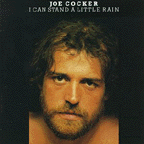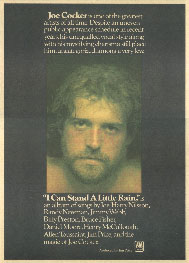![]()
  |

I Can Stand a Little Rain
Joe Cocker
A&M 3633
Released: August 1974
Chart Peak: #11
Weeks Charted: 36
 Joe Cocker's comeback album is not the disaster his recent debacle in L.A. (during which he was too drunk to perform) was. Whatever his difficulties as a live performer, on record Cocker is far from a lost cause. Admittedly he is not the singer he once was: His voice is ravaged almost beyond belief. But this is what makes I Can Stand a Little Rain so moving. It is a record about pain and decline which, to make its points, cruelly exposes and exploits Cocker's damaged condition.
Joe Cocker's comeback album is not the disaster his recent debacle in L.A. (during which he was too drunk to perform) was. Whatever his difficulties as a live performer, on record Cocker is far from a lost cause. Admittedly he is not the singer he once was: His voice is ravaged almost beyond belief. But this is what makes I Can Stand a Little Rain so moving. It is a record about pain and decline which, to make its points, cruelly exposes and exploits Cocker's damaged condition.
One example of this is "You Are So Beautiful," a Billy Preston song which, at its end, demands that Cocker reach two high notes he doesn't have a prayer of hitting. He stretches, struggles, quavers and fails; his failure makes the track and the listener hurt, which is precisely the record's intended effect. This is no rave-up in the Mad Dogs and Englishmen manner -- the album aches. Far from being a rocker, I Can Stand a Little Rain is slow, moody, depressed and arranged, and "I Get Mad" literally sounds as if Cocker is vomiting. More typical of the album is the title track by producer/arranger Jim Price and Jimmy Webb's "The Moon Is a Harsh Mistress." The first of these deals with Cocker's bid to return to the limelight and climaxes as Cocker groans, "And when I'm on my last go-round/I can stand another test." Webb's number is the best on the album, an extended metaphor which, if it originally referred to love, in this context has to do with success. Webb's bland piano and the lovely string arrangementare in jarring contrast to Cocker's tormented vocal, and the discrepancy between voice and arrangement further accentuates Cocker's alienation.
 Click image for larger view. |
- Ken Emerson, Rolling Stone, 10/10/74.
Bonus Reviews!
- Ed Naha, Circus, 11/74.
I find Joe Cocker depressing to watch these days -- too fat to wear dirty T-shirts with the old aplomb, perhaps, or too desperate about the dragged-out comeback -- he he still works pretty well in the studio. His voice still has power, and he still mauls and pummels a song until it yields unto him the things it didn't yield unto the person who wrote it. This doesn't always happen, of course, and there is, as usual, something vaguely unsatisfying about this album. Probably it is a sense of "excitement" being artificial -- Reddy Maid or Pree-Tide or Adjusto-Matic or some such -- which may have simply resulted from Joe's trying too hard. The first three selections have me wondering what he's so agitated about. And then Billy Preston and Bruce Fisher's "You Are So Beautiful" is picked at by a worrywart vocal treatment way beyond its simple, saftig soul, coming off as a bit of a farce. Joe even leaves us with the suggestion that he's cheating on the high notes, such is the way he screws around with the bridge of Randy Newman's "Guilty" (with Newman on piano) in the last track. But his range is still there, as listening to some of the other tracks reaffirms, and his intensity doesn't double-cross him when the song has a kind of spark that brightens, as opposed to going out, when fanned by his flailings. Cocker takes over two new Jim Webb songs, and "The Moon Is a Harsh Mistress" (Webb on piano) in particular proves that both Cocker and Webb can still be moving in a way that, thank God, defies analysis. Joe's interpretations of Harry Nilsson's "Don't Forget Me" and Allen Toussaint's "Performance" are as vulgar and delicate as any of the bold revisionist readings of his heyday. The backing tends to center now on horns, now on piano, but it doesn't fight with Cocker as much as his bands have on other occasions.
So the sound of Joe Cocker is once again (or perhaps still) in good shape. As for the rest of Joe Cocker, well, maybe we could try it again with the shirt tucked in....
- Noel Coppage, Stereo Review, 12/74.
There was no way that Joe Cocker could afford to blow this comeback. Thank God, for all his fans, for his record company and for the people who worry about him, he did a nice job this time around. Somehow or other I think everyne knew that if it didn't work this time it was never going to work again. I think the biggest surprise is that you don't have to be a Joe Cocker fanatic to get into and enjoy this album. The musicianship is extraordinary, and the vocal quality is as good (or better) now as it was when Cocker won so many hearts on "With A Little Help From My Friends."
Speaking of help from friends, a lot of exceptional talent went into the making of this album. Two of the most interesting moments on the disc are "Guilt" by Randy Newman and "The Moon Is A Harsh Mistress" by Jimmy Webb. The two songs are totally bereft of accompaniment except for piano work by the composer and some subtle strings. Newman's piano work is superior to Webb's, but it is quite an endorsement when two of America's finest songwriters sit down at the piano to back-up an interpreter of their songs.
Songs on this album are by everyone from Cocker to Harry Nilsson, Allen Toussaint and Billy Preston. Each song is given an intelligent interpretation with fine backing totally suited to the material. There is no feeling of an album style. Each song is treated as an entity unto itself; in fact, it almost seems as if Cocker were putting the songs into the spotlight on this LP. Everything possible is done to make sure that each song shows off its best advantage. On the crazed "I Get Mad," Cocker's screeching is in his best "Mad Dogs and Englismen" style. He shows only minutes later however, that he is just as capable of delicately interpreting "The Moon Is A Harsh Mistress." Somehow or other it makes me think of an old, rather obscure Rod Stewart track called "Little Misunderstood," where he genuinely proved he could sing. Suddenly Cocker is showing us things I, for one, would have never believed possible.
Giving credit where credit is due, a large part of the success of this album must go to the musicians, who included: Nicky Hopkins, Jim Price, Henry McCullough, Dave McDaniel, Ollie Brown, Jim Horn, Bernard Purdie and the consistently impressive choral work of Clydie King, Venetta Fields and Sherlie Matthews. The album was excellently produced and arranged by Jim Price who I now see as a master of consistently tasteful productions which only enhance and never drown, default, cover-up or in any way mar the vocal performances.
- Janis Schacht, Circus, 12/74.
After almost a two year layoff, Joe Cocker is back with what may well be his most consistently excellent singing since his heyday nearly five years back and perhaps the most entertaining variety of songs he has ever come up with. The powerful, bluesy vocals of Cocker sound better than ever and he can still belt with the best, but he has also picked up the ability to control his vocals on the softer side. Moving through material from Daniel Moore, Jimmy Webb, Randy Newman, Harry Nilsson, producer Jim Price and Henry McCullough, Cocker is provided with what may be the finest selection of songs he's had, as well as some of the best instrumental backup he's ever enjoyed. While the softness of much of the set may seem foreign to solid Cocker fans, it only takes a listen or two to get used to the changes. A truly solid return effort. Best cuts: "Put Out The Light," "I Can Stand a Little Rain," "The Moon Is A Harsh Mistress," "You Are So Beautiful," "Guilty."
- Billboard, 1974.
If Jim Price were a producer worthy of the artist, or even of the artist's memory, he would have asked Jerry Lee Lewis to play piano instead of Nicky Hopkins. Not that Jerry Lee could replace Chris Stainton, who combined with Cocker last time to write more good hooks than all of Hollywood's finest coughed up for this make-work project. C
- Robert Christgau, Christgau's Record Guide, 1981.
With I Can't Stand A Little Rain, Joe Cocker returned to interpreting songs instead of essaying his original songs. As usual, there are a couple of highlights, but a couple of awkward choices prevent the album from being as effective as Joe Cocker! or Mad Dogs and Englishmen. * * *
- Stephen Thomas Erlewine, The All-Music Guide to Rock, 1995.
![]() Reader's Comments
Reader's Comments
No comments so far, be the first to comment.